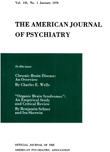TRAINING IN PSYCHOTHERAPY: THE USE OF MARRIAGE COUNSELING IN A UNIVERSITY TEACHING CLINIC
Abstract
From the example it is seen that favorable therapeutic results took place without going into multiple details concerning orality and intensive personality analysis.
To illustrate these techniques as they were used in a marriage counseling case, the significant details of a serious interpersonal conflict precipitated when the husband rejected his obese wife, have been presented. Both partners were seen individually and jointly by one therapist. The therapist focused on the day-to-day experience, eliciting the patient's feelings about reality situations which involved relationships to each other, parents and in-laws. Interpretations were kept to a minimum and were expressed simply, without technical terms. Ego strengths were supported. Ventilation of hostility was kept within tolerable limits. Solutions to difficulties evolved without going into genetics, details of personality structure, or the analysis of oral eroticism involved in obesity. The frame of reference was generally confined to present reality only occasionally moving into the past. The level of communication was interpersonal with occasional intrapersonal accents. The downward causal "spirals" of hostility, alienation, guilt and inadequacy were replaced with upward "spirals" of acceptance, increasing confidence, self-assertion and self-esteem through the corrective emotional experience with the therapist.
This presentation does not imply that detailed microscopic analysis and intensive psychotherapy should not be employed in some cases and the psychiatric residents familiarized with them. Psychotherapy is an inadequately conceptualized subject. It is difficult to teach. Learning should involve a variety of techniques. Residents need experience in experimental enrichment as well as in conventional patterns of psychotherapy. To answer partially this need, training for residents has been provided in the Marriage Counseling Clinic of the Division of Family Study of the University of Pennsylvania.
Access content
To read the fulltext, please use one of the options below to sign in or purchase access.- Personal login
- Institutional Login
- Sign in via OpenAthens
- Register for access
-
Please login/register if you wish to pair your device and check access availability.
Not a subscriber?
PsychiatryOnline subscription options offer access to the DSM-5 library, books, journals, CME, and patient resources. This all-in-one virtual library provides psychiatrists and mental health professionals with key resources for diagnosis, treatment, research, and professional development.
Need more help? PsychiatryOnline Customer Service may be reached by emailing [email protected] or by calling 800-368-5777 (in the U.S.) or 703-907-7322 (outside the U.S.).



